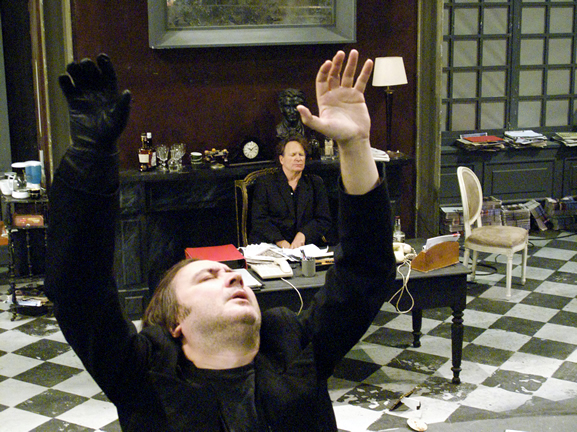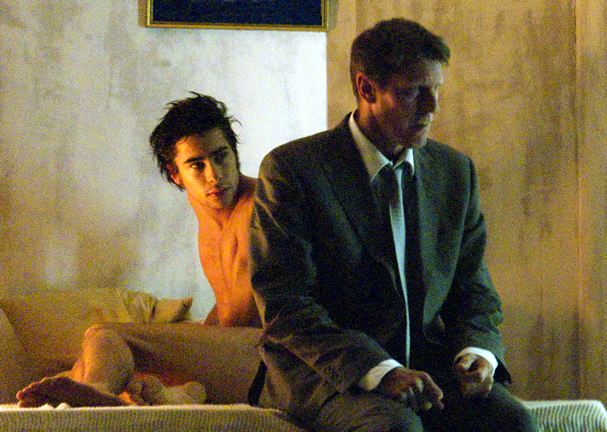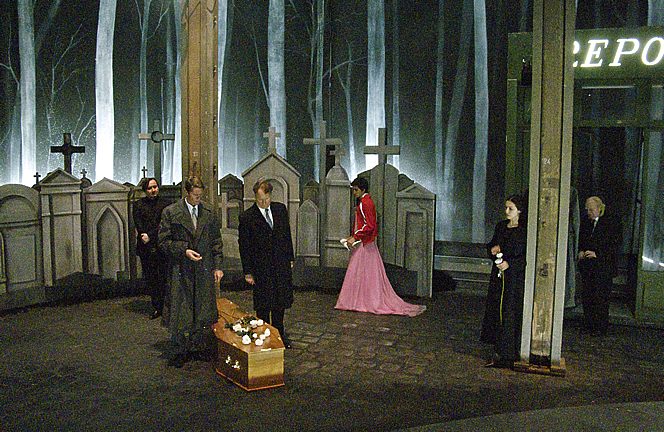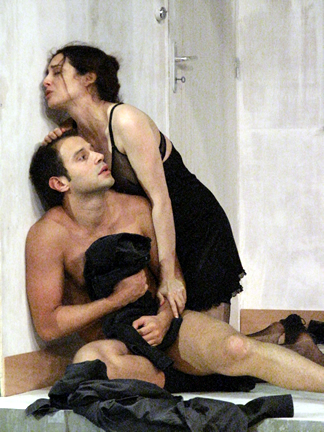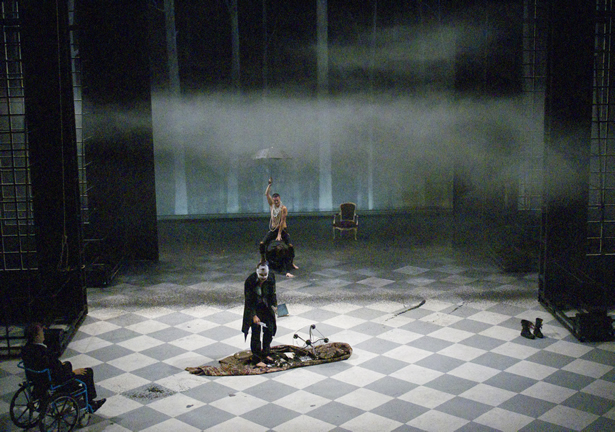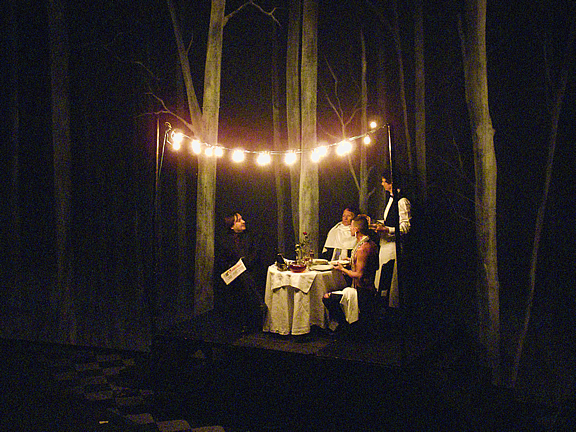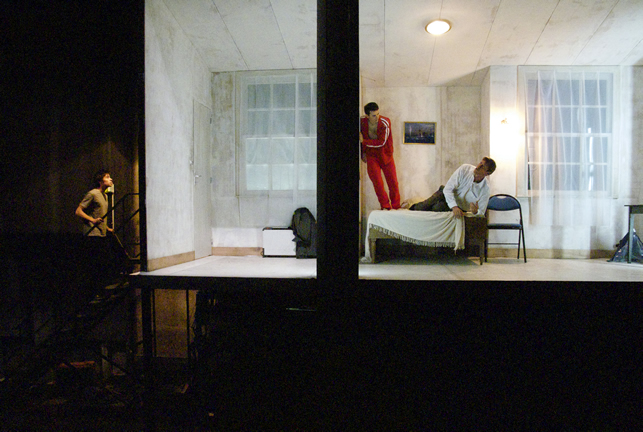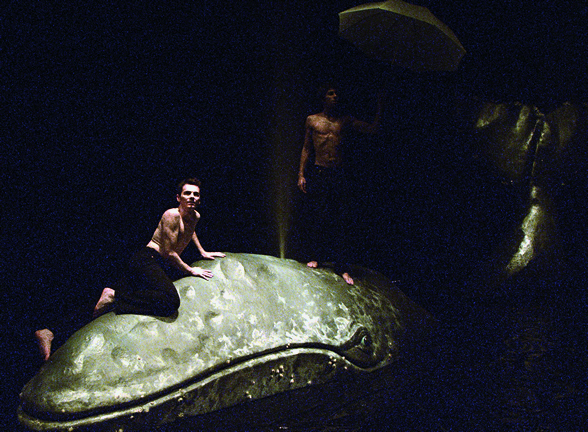Why would one wish for the worst ? - So that words may reclaim their power.
Olivier Py
We all know that the divine Saturn devoured his own children in order to conserve his throne. This mortal Saturn, imagined by Olivier Py also appears to have condemned his descendants to death. But he does so by letting them do all the work for him, like some creator who was absent from the world, in order to allow his creations to act freely. In this play without mothers, almost all of the ordinary family ties have been subverted - a brother and a sister love each other carnally, a father who dreams of ravaging all beauty is tormented by an evil passion for his own son...Concentrating all of the possible figures of fury and excess, here the family is at the heart of the most dazzlingly tragic darkness. At least when it is not, less gloriously so, at the heart of a bourgeois drama : one of the protagonists notes that « in tragedy...there is no reason for being, nothing. No explanation. Nothing. But in the bourgeois drama there is a reason for the catastrophe...our own cowardice. »
Oliver Py's play gives us two possible readings. One of them is to be approached as the chronicle of collective abdication, that of children who do not have the strength or the will to continue doing their father's work. The end of Saturn is also, according to its eponymous hero, that of a certain France, of a Republic that gave its name to the newspaper he runs, of a country that was also a landscape, « peasant and literary seeds » where writing and geography seemed to be one. According to Saturn, that particular France, the one that « invented politics », and that « is an idea », no longer seems capable of reinventing itself, devoid now of all sense of destiny and History. For him, the weakness of his own children, the unworthy heirs of the Republic, is the saddest of testimonies to the mediocrity of the times. He realizes that the truth of his legacy is elsewhere : there, where his illegitimate son lost his right hand for him, where the ink of the Republic has mixed with the blood of Ré, his son. And so it is with Ré, through him, that History will continue, even if it leads to tragedy, without any other « reason » than a crazed fatality of love and hatred : it is through Ré that Saturn will perhaps meet an end that is worthy of his ogre's appetite. The combat between father and son, this nagging struggle that Olivier Py returns to play after play, takes on new angles and accents in this play. Is the experience of the pain and suffering that one has inflicted upon others and upon oneself, the only possible path that one can clear on the way to « love, love, that very pure love » that Saturn himself celebrates on his deathbed ? The answer is perhaps incarnated in the figure of a young man who shows boundless, filial piety : Nour, the stranger whose name means light, and his friend Virgil, named after a poet who himself, crossed the expanses of hell.
Oliver Py's play gives us two possible readings. One of them is to be approached as the chronicle of collective abdication, that of children who do not have the strength or the will to continue doing their father's work. The end of Saturn is also, according to its eponymous hero, that of a certain France, of a Republic that gave its name to the newspaper he runs, of a country that was also a landscape, « peasant and literary seeds » where writing and geography seemed to be one. According to Saturn, that particular France, the one that « invented politics », and that « is an idea », no longer seems capable of reinventing itself, devoid now of all sense of destiny and History. For him, the weakness of his own children, the unworthy heirs of the Republic, is the saddest of testimonies to the mediocrity of the times. He realizes that the truth of his legacy is elsewhere : there, where his illegitimate son lost his right hand for him, where the ink of the Republic has mixed with the blood of Ré, his son. And so it is with Ré, through him, that History will continue, even if it leads to tragedy, without any other « reason » than a crazed fatality of love and hatred : it is through Ré that Saturn will perhaps meet an end that is worthy of his ogre's appetite. The combat between father and son, this nagging struggle that Olivier Py returns to play after play, takes on new angles and accents in this play. Is the experience of the pain and suffering that one has inflicted upon others and upon oneself, the only possible path that one can clear on the way to « love, love, that very pure love » that Saturn himself celebrates on his deathbed ? The answer is perhaps incarnated in the figure of a young man who shows boundless, filial piety : Nour, the stranger whose name means light, and his friend Virgil, named after a poet who himself, crossed the expanses of hell.
Cast
Play written and directed by Olivier Py
September 18th - October 24th, 2009
Ateliers Berthier 17e
Set, costumes & make up : Pierre-André Weitz
lights : Olivier Py avec Bertrand Killy
with Nâzim Boudjenah, Amira Casar, Matthieu Dessertine, Mathieu Elfassi, Michel Fau, Philippe Girard, Frédéric Giroutru, Laurent Pigeonnat, Olivier Py, Bruno Sermonne, Pierre Vial (member of the Comédie-Française)
production Odéon-Théâtre de l'Europe
,


